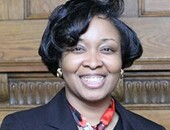The Truth Can't Be Concealed When Learning About Racism
Dr. Jessica A. Johnson
I took some time this week to watch the MSNBC National Day of Racial Healing town hall sponsored by the W.K. Kellogg Foundation. Hosted by MSNBC's Joy Reid and Chris Hayes, the town hall discussion examined the ongoing danger that White supremacist ideology poses to our nation, as well as the challenges many schools have in teaching the truth about our country's oppressive history against racial and ethnic groups. The media headlines of recent hate crimes featured at the beginning of the program were distressful reminders that a malevolent remnant of racism has remained in America since the landmark, legislative triumphs of the civil rights movement. In one story, the image of a boys' restroom that had the vile message "I hate blacks" scribbled in the stalls showed how White supremacist doctrine has infested the town of Southbury, Connecticut. When the Southbury incident was broadcasted last December, it was the eighth town in Connecticut that had been targeted with racist literature.
One of the most emotional and inspiring moments of the town hall was when Minnijean Brown-Trickey, a member of the Little Rock Nine, was brought to the stage alongside Pulitzer Prize-winning reporter and 1619 Project creator Nikole Hannah-Jones. At 81, Miss Minnijean, as Hannah-Jones referred to her, is vibrant and sharp with profound words of wisdom to share about her lifelong activism. Miss Minnijean explained to the audience how the story of the Little Rock Nine has been given scant space in American history textbooks, "usually one page," as she concisely described it. She discussed what students are missing by not being fully taught about the intense struggle to end segregation in public schools. In the case of the Little Rock Nine, Miss Minnijean stated that young people could learn about "courts, non-violence, (the) persistence of the human spirit, (and) journalism." To me, her most insightful statement was when she mentioned: "We deny our children truth. And they love truth. They desire truth. So, we have an obligation to give them truth and give them complexity."
In thinking about truth when it comes to studying American history, I often reflect on a scripture I've carried throughout my life, John 8:32, where Jesus said, "And ye shall know the truth, and the truth shall make you free." While Jesus was specifically referring to the liberty that comes with knowing God, I think this basic spiritual principle of knowing truth is fundamentally applicable when teaching history, especially the harsh realities of America's past. From my own experience in teaching about U.S. racism and segregation in my African American sports history and TV diversity courses at Ohio State University's Lima campus, I have found that my students, the majority of whom are White, appreciate learning about events and people that were not featured in their high school curriculums.
When we began the spring semester this year, I told my students that I am approaching the material we are covering as a storyteller. In my African American sports history class, we just finished our first segment on Jack Johnson, America's first Black heavyweight champion during the Jim Crow era. There is not a more complex and controversial sports figure than Johnson, who in 1910 defended his title in the U.S. by defeating Jim Jeffries, the former champion who was pushed out of retirement and deemed the "Great White Hope." To provide my students with a better understanding of the racial mores during the early Jim Crow period in which Johnson lived, I discussed the end of Reconstruction, which occurred the year before Johnson was born, and the threat of lynchings that haunted Black men living in the South. In explaining the historical impact of lynchings today, I shared that President Joe Biden signed the Emmett Till Antilynching Act last year, after more than 200 attempts to outlaw this heinous act of murder had failed. When I read the discussion board responses on Johnson from my students, many spoke about the courage he had to fight for his boxing career and live life on his own terms. They thought the racism of this era, as one student put it, was literally "insane."
The Kellogg Foundation will continue its conversation on racial healing throughout 2023, and I believe that truth telling in education will play a vital role, particularly for younger generations. For the college students that I am blessed to work with, I am encouraged to see them learn about the past in an environment that does not make them feel intimidated or offended. Simply telling the truth is a powerful weapon against racism.
Dr. Jessica A. Johnson is a lecturer in the English department at Ohio State University's Lima campus. Email her at smojc.jj@gmail.com. Follow her on Twitter: @JjSmojc.
Photo by Cristofer Maximilian on Unsplash






You must be logged in to post stack comments. Please Login or Signup (free).